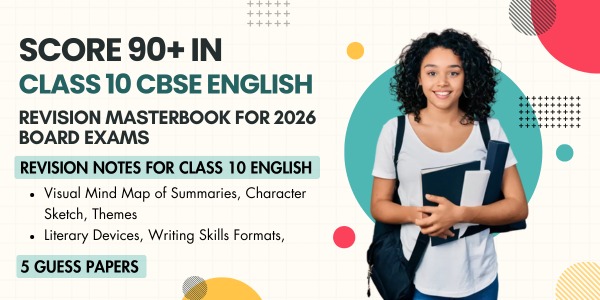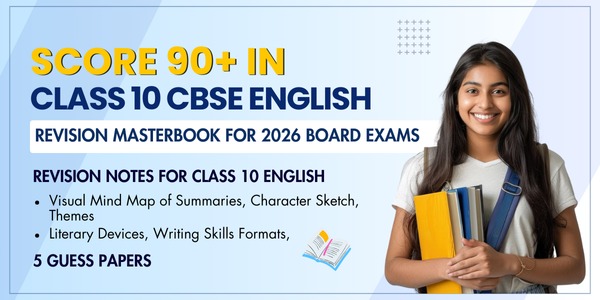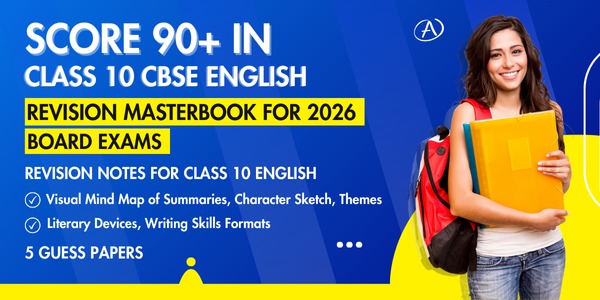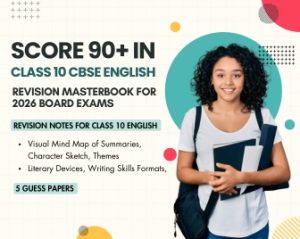CBSE Class 10 First Flight Book Chapter 5 Glimpses of India Question Answers from previous years question papers (2019-2025)
Glimpses of India Previous Year Questions with Answers – Question Answers from Previous years Board Exam Question papers provide valuable insights into how chapters are typically presented in exams. They are essential for preparing for the CBSE Board Exams, serving as a valuable resource.They can reveal the types of questions commonly asked and highlight the key concepts that require more attention. In this post, we have shared Previous Year Questions for Class 10 English Chapter 5, “Glimpses of India”.
Glimpses of India Part 1 – A Baker from Goa
Questions from the Chapter in 2025 Board Exams
Q1 . The portrayal of the baker’s attire and role in the village emphasize the cultural and social significance of bread-making within the community. Elaborate. (Glimpses of India – A Baker from Goa) [40-50 words]
Ans. Bakeries hold an important role in the Goan culture and tradition. Bakers wear traditional attire called Kabai and visit the households twice a day to supply the freshly baked goods. Goan tradition involves the use of different baked goods on different occasions and festivals.
For All Class 10 English Lesson Explanation, summary, Character Sketch, MCQs and Previous Years Question Papers Click here
Questions which came in 2024 Board Exam
Q1. The baker and his family never starved. Elaborate. [2024, 40-50 words]
Ans. Bakery was a profitable profession because baked goods were an essential part of the Goan tradition. The baker would visit each and every house, twice a day. Bread and other baked goods were staple diet of Goans. The bakers had a Jackfruit-like belly which indicated prosperity.
Q2. “During our childhood in Goa, the baker used to be our friend, companion and guide.” What does this statement imply in relation to the character of the baker? [2024, 40-50 words]
OR
The author says – ‘During our childhood in Goa, the baker used to be our friend, companion and guide.’ Elaborate. [2024, 40-50 words]
Ans. This tells us that a baker was a respected person. He was well-learned and so, the people sought his advice and confided their secrets in him. He visited the households everyday and supplied freshly baked goods. Some of them were essential part of various festivals and traditions and so, a baker was like a family member in Goan families.
Q3. Why does the author say that the presence of the Baker’s furnace in the village is absolutely essential? Justify with reference to “A Baker from Goa”. [2024, 40-50 words]
Ans. The author says this to suggest that in Goa, there was a bakery in every village. This indicates the importance of baked goods in Goan cuisine. Various preparations were part of festivals and occasions. Cakes and bolinhas for Christmas, sandwiches for the daughter’s engagement, wedding gifts included bol. As a child, the author would have bread bangles every morning. Thus, the presence of a baker’s furnace in every village is justified.
Q4. In the chapter ‘A Baker from Goa’ the narrator talks about his childhood in Goa and his fond memories. In about 120 words write a presentation draft comparing the childhood of the narrator in ‘A Baker from Goa’ to that of Nelson Mandela.
You may begin this way :
Childhood memories remind us of the days gone by…..
Reference : A Baker from Goa and Nelson Mandela : Long Walk [2024, 120 words]
Ans. Childhood memories remind us of the days gone by. The author of the story A Baker from Goa reminisces the good old days when he lived in Goa. He elaborates about the lazy mornings when they would meet the baker who visited twice a day to sell baked goods. The kids would look for the favourite bread bangles, eat them without brushing their teeth. The entire story is filled with nostalgia where we get to know the importance of a baker in Goan households. The baker was like a friend, companion and guide to the narrator. He also throws light on the significance of baked items in Goan culture which makes the baker an essential part of the community. Thus, the narrator shares sweet memories of his childhood.
Nelson Mandela’s childhood was also full of freedom. He was free to do whatever he wished for. Like run in the fields, swim in the stream, roast mealies under the night sky and ride the bulls. He also has sweet memories of his childhood when he enjoyed the freedom to do follow his heart. All he was expected was to obey his father and follow the rules of his tribe.
Thus, we notice that both of them are nostalgic about their childhood. They miss the good old days when they had a carefree life.
Questions from the Chapter in 2023 Board Exams
Q1. ‘A Baker from Goa’ is a nostalgic saga of childhood memories. Comment. [2023, 40-50 words]
Ans. “A Baker from Goa” evokes nostalgia through vivid childhood memories of the traditional baker’s visits. The story recalls the excitement of hearing the bamboo’s jingle, rushing to meet the baker, and the delight of choosing bread-bangles. It paints a nostalgic picture of simpler times and the joy derived from small pleasures in village life.
Q2. Who are paders and why are they friends of children? [2023, 40-50 words]
Ans. Goa’s village bakers, known as paders, sell their bakery products by going from door to door. The children in these villages are particularly fond of them as they bring bread bangles and loaves every morning. While the loaves are sold to households, the children enjoy freely munching on the delicious bread bangles.
Q3. How is the Goan baker still an important part of the life of a Goan village? [2023, 40-50 words]
Ans. In a Goan village, a baker, also known as a “pader,” holds a significant and indispensable role. Bakery items like bol, bolinhas, and cakes are essential components of every social and religious ceremony in the village, and without them, these events are incomplete. Additionally, the daily life-cycle of a Goan household commences with the cheerful arrival of the baker in certain areas, heralded by delightful music. Beyond being a baker, he becomes a friend, companion, and guide to the villagers. His distinct attire and stout physique are strong defining characteristics that contribute to his unique identity within the community. Hence, the baker’s presence and contributions remain cherished and vital to the vibrant fabric of Goan village life.
Questions which came in 2022 Board Exam
Q1. How did the baker become synonymous with celebrations and occasions in Goa? [2022, 30-40 words]
Ans. A baker is very important and essential for a Goan village. He does not merely represent a profession but a highly admired Portuguese tradition. His breads are essential on each and every occasion. Marriage gifts are meaningless without the sweet bread known as the bol. Cakes and bolinhas are a must for Christmas as well as other festivals. A mother prepares sandwiches on her daughter’s engagements. Meals are incomplete without bakery goods. Bakery is an important part of Goan food and culture. The baker, known as Pader, enjoys the respect and love of the people. The children consider him their friend, companion and guide. They have continued their family profession. It is a highly profitable business. Thus, the presence of the baker’s furnace in the Goan village is absolutely necessary.
Q2. What does the writer recall about his childhood in Goa? [2022, 30-40 words]
Ans. The author reminisces his childhood days spent in Goa when the baker was a prominent part of their lives. He gives details of the Goan culture where bakery goods are an essential part of festivals and ceremonies. The baker visited each Goan house twice a day. Bakery was a profitable profession and a baker was treated as a friend, guide and companion. People would take a note of daily transactions with the baker and monthly payments were made to him.
Questions that appeared in 2020 Board Exams
Q1. Why were the children fascinated by the baker? How did they show their eagerness to see him? [2020, 100-150 words]
Ans. The children were fascinated by the jhang-jhang sound of the baker’s bamboo which they would hear every morning. It would announce the arrival of the baker. They would hunt the basket for their favourite items like bread bangles and would eat them without washing the faces or brushing their teeth. The baker was like a friend and companion to them. The bakery was an essential part of the Goan households. All the children, including the author were close to the baker of the village.
2019 Exam Question and Answers from the chapter
Q1. Read the extract given below and answer the questions that follow:
The baker usually collected his bills at the end of the month. Monthly accounts used to be recorded on some wall in pencil. Baking was indeed a profitable profession in the old days. The baker and his family never starved. He, his family and his servants always looked happy and prosperous. Their plump physique was an open testimony to this. Even today any person with a jackfruit-like physical appearance is easily compared to a baker. [2019]
(a) Where did the baker record his accounts?
Ans. The monthly accounts were recorded on some wall.
(b) Why did the baker and his family never starve?
Ans. They never starved because the bakery products were always in demand
(c) Which word in the extract is a synonym of ‘rich’?
Ans. prosperous
(d) How can a baker be identified in Goa?
Ans. The jackfruit-like physical appearance of a person identifies him as a baker.
Q2. How do we know that Goa’s bakers are very prosperous? [2019, 30-40 words]
Ans. Goa’s bakers are prosperous because there is an immense demand of bakery items. Some preparations are a part of various occasions and ceremonies. People buy breads and other baked goods every morning.
Q3. What importance does a baker enjoy in a Goan village? [2019, 30-40 words]
Ans. A Baker is considered a family member. Every morning, the people wake up to the jhang-jhang and thud of the baker’s bamboo. The baker visits twice a day and people buy bread and other baked goods on a daily basis.
Also see:
Glimpses of India (Part 1 – A Baker from Goa) Important Questions, NCERT Solutions, Extra Questions
Glimpses of India (Part 1 – A Baker from Goa) Summary, Explanation
Glimpses of India (Part 1 – A Baker from Goa) MCQs
Glimpses of India (Part 1 – A Baker from Goa) Character Sketches
Glimpses of India Part 2 – Coorg
Questions from the Chapter in 2025 Board Exams
Q1. Why does the author refer to Coorg as the kingdom of heaven? (Glimpses of India – Coorg) [40-50 words]
Ans. Coorg is referred to as a slice of heaven from the kingdom of God. This is a land of rolling hills, evergreen forests, wildlife and the home of the brave and fierce Coorgi race. Thus, the scenic beauty and rich heritage make it nothing less than a heaven.
Questions which came in 2024 Board Exam
Q1. The most laid back individuals become converts to the life of high-energy adventure. Elaborate with reference to Coorg. [2024, 40-50 words]
Ans. Coorg has abundance of serene landscapes and coffee plantations. One can participate in adventure sports like trekking and biking in the forests, river rafting and canoeing in the wild waters of river Kaveri, rock climbing and mountaineering on the Brahmagiri hills. There are several attractive options that even the most laid back individuals can feels energised and get tempted to participate.
Q2. Coorg has been defined as a ‘piece of heaven’ by the writer. Justify. [2024, 40-50 words]
Ans. Coorg has been defined as a piece of heaven because of the stunning natural beauty. The rolling hills, lush coffee plantations, colonial bungalows tucked under tree canopies and an abundance of flora and fauna. There are cascading waterfalls, walking trails, a panoramic view from the Brahmagiri hills. One can visit the island Nisargadhama via a rope bridge and also visit India’s largest Tibetan settlement of Bylakuppe.
Q3. “Coorgi homes have a tradition of hospitality, and they are more than willing to recount numerous tales of valour related to their sons and fathers.”
Elaborate with reference to the chapter “Glimpses of India”. [2024, 40-50 words]
Ans. The people of Coorg are fierce and brave. The families have a tradition of hospitality. The Coorg regiment of the Indian Army is the most decorated and General Cariappa, the first Chief of the Indian Army was a Coorgi. The fact that the Coorgis are the only race that are permitted to carry firearms without a licence establishes their valour and bravery.
Questions from the Chapter in 2023 Board Exams
Q1. Where is Coorg located? Write any two characteristics of the people of Coorg? [2023, 40-50 words]
Ans. Coorg is located in the state of Karnataka, India, between Mysore and the coastal town of Mangalore. The people of Coorg are known for their martial traditions and distinct culture, possibly tracing back to Greek or Arabic origins. They are also famous for their hospitality, often sharing stories of their ancestors’ bravery.
Q2. Valour and hospitality are inherent in the people of Coorg. Explain. [2023, 40-50 words]
Ans. The people of Coorg are famous for their bravery. They are known to be of either Arabic or greek descent. The Koorgis narrate tales of valour of their ancestors and they are allowed to carry firearms without licenses. The homes in Coorg are well-known for their hospitality.
Questions which came in 2022 Board Exam
Q1. What attracts visitors to Coorg? [2022, 30-40 words]
Ans. Coorg is a complete tourist destination which offers something for everyone. Nature lovers can enjoy the tree canopy covered colonial bunglows, coffee plantations, walking trails and rolling hills. Bylakuppe, a Tibetan settlement provides a peek into Tibetan culture. Sports enthusiasts can enjoy water sports like rafting, canoeing. For wildlife lovers, coorg offers a diverse flora and fauna and adventure seekers can opt for birdwatching and spotting wildlife. The rich heritage and culture of Coorg attracts Historians. Those who are looking for a peaceful vacation can enjoy the calm, scenic beauty of Coorg.
Q2. Why is Coorg called the land of the rolling hills? [2022, 30-40 words]
Ans. Coorg is surrounded by hills. These are rolling hills because the slope is gentle and provides an expansive view of the area. The Brahmgiri hills give a panoramic 360 degree view of Coorg.
Q3. Why are Kodavus permitted to carry fire arms without licence? [2022, 30-40 words]
Ans. The Kodavus or Coorgis are fierce and brave race known for their courage and integrity. The most brave soldiers of the Indian Army, from the Coorg Regiment are a testament of this. Thus, they are allowed to carry firearms without licence.
Q4. Kodavus have contradictory traits. Support the statement with reference to the text. [2022, 30-40 words]
Ans. The Kodavus are well-known for their hospitality and are fierce too. These atre two contradictory traits. The race is known for being friendly and warm towards outsiders. Also, the men are extremely brave, and fierce warriors.
Q5. Describe the Climb to the Brahmagiri hills. [2022, 30-40 words]
Ans. The Brahmagiri hills are one of the rolling hills surrounding Coorg. The climb is adventurous and one can spot the varied flora and fauna. One gets a panoramic view of the misty landscape of Coorg from the Brahmagiri hills.
Questions that appeared in 2020 Board Exams
Q1. Why is Coorg called the land of rolling hills? [2020, 30-40 words]
Ans. Coorg is called the land of rolling hills because it has a lot of hills and itself is a hill station. The hills seems to roll down, giving a panoramic view. A rolling hill is a hill which has a gentle slope. The climb is gradual and the inclination of the slope of the hill is not too high.
2019 Exam Question and Answers from the chapter
Q1. How is the Coorgi tradition of courage and bravery recognised in modern India? [2019, 30-40 words]
Ans. The Coorg Regiment is one of the most decorated in the Indian Army and the First Chief of the Indian Army, General Cariappa was a Coorgi. The Coorgis are the only people in India who are permitted to carry firearms without a licence. Thus, we see that the Coorgi tradition of courage and bravery is recognised in Modern India.
Also see:
Glimpses of India (Part 2 – Coorg) Important Questions, NCERT Solutions, Extra Questions
Glimpses of India (Part 2 – Coorg) Summary, Explanation
Glimpses of India (Part 2 – Coorg) MCQs
Glimpses of India Part 3 – Tea from Assam
Questions from the Chapter in 2025 Board Exams
Q1. Pranjal seemed to have a different level of enthusiasm compared to Rajvir when they both saw the tree plantation. Justify. (Glimpses of India) [40-50 words]
Ans. Since Pranjal was from Assam, he was not curious and excited on seeing the tea plantations. However, Rajvir was experiencing the place for the first time. He was captivated by the expansive plantations and was eager to know more about the place.
Questions which came in 2024 Board Exam
Q1. Read the given extracts and answer the questions :
The train pulled out of the station — Pranjol buried his nose in his detective book again. Rajvir too was an ardent fan of detective stories but, at the moment he was keener on looking at the beautiful scenery. It was green, green everywhere. Rajvir had never seen so much greenery before. Then the soft green paddy fields gave way to tea bushes. It was a magnificent view. Against the backdrop of densely wooded hills a sea of tea bushes stretched as far as the eye could see. Dwarfing the tiny tea plants were tall, sturdy, shade-trees and amidst the orderly rows of bushes busily moved doll-like figures. (Glimpses of India — Tea from Assam) [2024]
(i) State any one inference about Rajvir from the given context:
“Rajvir too was an ardent fan of detective stories, but at the moment he was keen on looking at the beautiful scenery.”
Ans. Rajvir was ecstatic and fascinated by the scenery that he saw outside that he kept on admiring it instead of reading his favourite detective stories.
(ii) State True or False :
The reason Rajvir was interested in looking at the beautiful scenery was that the detective book he was reading, was not interesting.
Ans. False
(iii) People who live in big cities are always fascinated by the natural beauty and abundant greenery. Elaborate in about 40 words, with reference to the extract.
Ans. People who live in big cities often find natural beauty and abundant greenery fascinating because they are usually surrounded by concrete structures and urban landscapes. The sight of vast green fields and scenic views provides a refreshing contrast to their usual environment, evoking a sense of peace and wonder.
(iv) Which phrase would correctly substitute ‘doll-like figures’, in the given sentence from the extract?
Dwarfing the tiny tea plants were tall sturdy shade-trees and amidst the orderly rows of bushes busily moved doll-like figures.
Ans. Tiny women
Questions from the Chapter in 2023 Board Exams
Q1. What did Pranjol and Rajvir do during the journey? Why? [2023, 40-50 words]
Ans. During their train journey to Assam, Pranjol and Rajvir drank tea and chatted. Rajvir had gathered information which he shared with Pranjol. He shared interesting facts about tea, such as its worldwide popularity and legends about its discovery. Rajvir was fascinated by the lush greenery and tea gardens. Pranjol was calm and read his detective story books throughout the trip. Pranjol had traveeled on this route earlier and so, he was not excited like Rajvir.
Q2. What is the Indian legend about the discovery of tea? [2023, 40-50 words]
Ans. Bodhidharma, an ancient Buddhist ascetic, cut off his eyelids because he felt sleepy during meditations. Ten tea plants grew out of the eyelids. The leaves of these plants when put in hot water and drunk banished sleep.
Q3. Why did Pranjol not share Rajvir’s excitement at seeing the tea gardens? [2023, 40-50 words]
Ans. Pranjol had taken the train to Assam several times earlier. He was familiar with the scenery and the tea plantations. Thus, he was not excited as Rajvir was.
Questions which came in 2022 Board Exam
Q1. What impressed Mr. Barua about Rajvir? [2022, 30-40 words]
Ans. Mr Barua was impressed by the fact that Rajvir had collected detailed information about the tea plantations of Assam. He knew about the flushes of tea, the seasons when they were plucked and he also had information about the development of tea as a beverage and medicine through the years.
Questions that appeared in 2020 Board Exams
Q1. Rajvir was very fond of reading detective stories. Why did he not like to read them during his journey? [2020, 30-40 words]
Ans. Rajvir liked reading detective stories. However, on the train journey to Assam, he was excited to see the scenery outside. Thus, he did not read the stories and enjoyed the scenic beauty.
2019 Exam Question and Answers from the chapter
Q1. Why did Pranjol not share Rajvir’s excitement on seeing the tree plantation? [2019, 30 – 40 words]
Ans. Pranjol was not excited on seeing the tree plantations because it was his home and he had seen them earlier too. However, Rajvir was visiting Assam for the first time and was excited to see the tea plantations.
Also see:
Glimpses of India (Part 3 – Tea from Assam) Important Questions, NCERT Solutions, Extra Questions
Glimpses of India (Part 3 – Tea from Assam) Summary, Explanation
Glimpses of India (Part 3 – Tea from Assam) MCQs
Glimpses of India (Part 3 – Tea from Assam) Character Sketches




